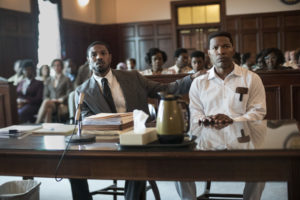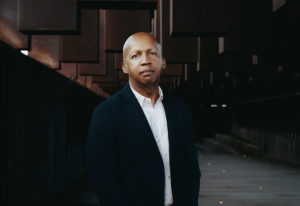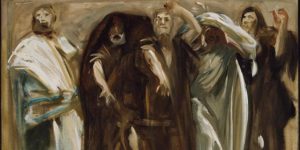Slavery
“Inspire to change.” See this.
January 11, 2020“I believe that hopelessness is the enemy of justice.”
-Bryan Stevenson
WBUR/TONYA MOSLEY
Michael B. Jordan (left) as Bryan Stevenson and Jame Foxx as Walter McMillian in “Just Mercy.”
(Photo by Jake Giles Netter/Warner Bros. Pictures)
Bryan Stevenson: “Many people, most people in this country don’t want there to be inequality and injustice. They don’t want people to be treated unfairly or cruelly. I just think if you get closer to it, you’ll be motivated to say more, to do more. I do hope people that see this film will walk away with a greater consciousness about why we need to do better in this country when it comes to creating a justice system that is fair and reliable.”
On addressing racist legacies, which have contributed to nearly 42% of death row inmates being black
“I think we do have to begin talking more honestly about our history of racial injustice. I don’t think our country has ever engaged in any meaningful process of acknowledging the injustice, the inequality. I think we’re a post-genocide society. What we did to Native people was a genocide, and we haven’t acknowledged that. And we’ve allowed systems to continue that have been compromised by these narratives of racial difference. I think the great evil of slavery was involuntary servitude. It was this idea that black people aren’t as good as white people. And that continues after the 13th Amendment. That’s why I’ve argued slavery doesn’t end, it just evolves, and we had 100 years of terrorism and lynching and violence where black people were pulled out of their homes and beaten and murdered and drowned and tortured and lynched. And we’ve never really talked about that. And even though we pay more attention to the civil rights era, we haven’t confronted the fact that this presumption of dangerousness and guilt that gets assigned to black and brown people is still with us. It’s why these police encounters with young black people that end up with lethal violence are so disruptive and so painful.”
“The great gift I have is that I am the great grandson of people who were enslaved and they believed in freedom when it wasn’t rational to. And I’m the grandchild of people who were terrorized by lynching and they believed in a better future, even though that didn’t seem logical. I’m the child of people humiliated by segregation and Jim Crow, and yet they believed I could be anything I want. And it’s that orientation of hopefulness that has sustained me. We say in the film and I say when I give talks, ‘I believe that hopelessness is the enemy of justice.’ If you want to do justice work, you have to be prepared to believe things you haven’t seen. And it’s what continues to define the work I try to do today.”
‘Do people deserve to die for the crimes they’ve committed?’ I think the threshold question is, ‘Do we deserve to kill?’”
This 60 Minutes piece is referenced and recreated in the film, “Just Mercy.” Then correspondent Ed Bradley interviewed Bryan Stevenson and others about Johnny D…Walter McMillian…aired on November 22, 1992.
The True Story Behind “Just Mercy”.
On September 19, 1988, Judge Robert E. Lee Key, Jr., the first presiding judge (Yes, his real name) overruled the jury’s recommendation of a life sentence and imposed the death penalty.
Bryan Stevenson and Walter McMillian remained friends until Walter’s death in 2013. He died after he developed dementia believed to have been brought on by the trauma of imprisonment. [From Stevenson, Bryan (2014). Just Mercy: A Story of Justice and Redemption. New York: Spiegel & Grau. p. 368.].
#CivilObligation
July 4, 2019
Thursday, July 4, 2019
Sister Simone Campbell, SSS—known as “the nun on the bus”—is someone I consider a modern prophet. She is the Executive Director of NETWORK, an organization that lobbies for socially just federal policies. On this “Independence Day” (in the United States), reflect on Sr. Simone’s invitation to co-create our collective freedom.
In the last half of the twentieth century, thankfully, our society began to engage in a serious process of trying to atone for the sin of slavery, and in doing so much emphasis was placed on promoting civil rights. An unintended consequence of this important movement was a heightened focus on individuals and individual exercise of the freedoms guaranteed in the Constitution. The civil rights movement came out of community, but the legal expression focused on individuals’ capacity to exercise their freedoms. Some fearful Americans—largely white men who professed a conservative version of Christianity—felt threatened, as if there were not enough rights to go around. They sought to create their own “movement.” This reaction in part fueled the rise of the tea party movement. . . .
But a democracy cannot survive if various groups and individuals only pull away in different directions. Such separation will not guarantee that all are allowed the opportunity for “life, liberty, and the pursuit of happiness.” All people must be recognized for their inherent dignity and gifts regardless of the color of their skin, their religious beliefs, or their place of origin. And all these gifts need to be shared in order to build up the whole.
So I have begun to wonder if the new task of the first half of the twenty-first century should be a commitment to civil obligations as a balance to the focus on civil rights.
Civil obligations call each of us to participate out of a concern and commitment for the whole. Civil obligations call us to vote, to inform ourselves about the issues of the day, to engage in serious conversation about our nation’s future and learn to listen to various perspectives. To live our civil obligations means that everyone needs to be involved and that there needs to be room for everyone to exercise this involvement. This is the other side of civil rights. We all need our civil rights so that we can all exercise our civil obligations.
The mandate to exercise our civil obligations means that we can’t be bystanders who scoff at the process of politics while taking no responsibility. We all need to be involved. Civil obligations mean that we must hold our elected officials accountable for their actions, and we must advocate for those who are struggling to exercise their obligations. The 100 percent needs the efforts of all of us to create a true community.
It is an unpatriotic lie that we as a nation are based in individualism. The Constitution underscores the fact that we are rooted and raised in a communal society and that we each have a responsibility to build up the whole. The Preamble to the Constitution could not be any clearer: “We the People” are called to “form a more perfect Union.”
-Richard Rohr, Center for Action & Contemplation
Simone Campbell with David Gibson, A Nun on the Bus: How All of Us Can Create Hope, Change, and Community (HarperOne: 2014), 180-182.
Image credit: Frieze of the Prophets (detail), John Singer Sargent, circa 1892, Museum of Fine Arts, Boston, Massachusetts.


